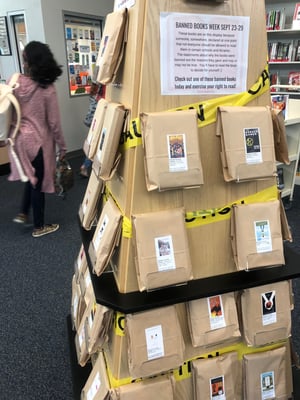Banned Books Week is an annual event that is usually held in the last week of September. It was first started in 1982 in response to books being challenged for their content in schools, bookstores and libraries. The American Library Association, the American Booksellers Associators and several other groups sponsor this event each year.
What does it mean for a book to be banned?
In general, book banning occurs when someone (parent, student, community member, etc) asks for a school, library, bookstore or class to remove a certain book, or not assign it as required or suggested reading. Most public libraries and schools have challenged book procedures in place that requires a committee to examine the book, but not everyone follows these rules. The consequences vary from a book being removed from libraries, returned to them, or restricted in some way. Conversely, a book getting challenged often leads more people to want to read it.
Why do books get banned?
Sometimes people try to get a book banned because they have a moral objection to the content (i.e. thinking Harry Potter could lead children to practice witchcraft). Other books were banned by totalitarian regimes that realized certain books could threaten their power (i.e. the USSR banning Animal Farm). And some reasons are just kind of ridiculous (i.e. wanting to ban The Diary of Anne Frank from being assigned because it's "too depressing".)
Some of the Most Challenged Books of 2017:
(By the way, the top ten most challenged books from last year include New York Times Bestsellers and books that have won the National Book Award, the Lambda Literary Award, Stonewall Honor Award and the Pulitzer Prize.)
- Thirteen Reasons Why, by Jay Asher - This book started getting attention again after the Netflix series aired. It deals with suicide.
- The Absolutely True Diary of a Part-time Indian, by Sherman Alexie - This book has frequently been challenged since 2007 because of language, sexual content and alcoholism.
- Drama, by Raina Telgemeier - Graphic novel about a theater program geared towards elementary and middle grade students. Has been challenged in schools and libraries because it includes gay characters and a scene where two boys kiss.
- To Kill a Mockingbird by Harper Lee - This classic is frequently banned because it includes usage of the N word.
- The Hate U Give by Angie Thomas - This bestseller about a police shooting of an unarmed black teenager was banned by an entire district in Texas for “vulgarity and racially insensitive language”. The book eventually got back on the library shelves, but students now have to have a parent permission slip to read it.
Sources: